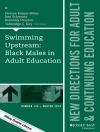Winner of the AAACE Cyril O. Houle Award
This book re-imagines the essence and role of adult education at both the individual and societal levels. It provides arguments for understanding adult education as a process of agency and empowerment, which has not only instrumental but intrinsic and transformative roles to play. This book brings together ideas from the capability approach with insights from recognition theory; the embeddedness approach; the political economic perspective for understanding public and private goods and the common goods perspective. The analysis draws on data from large-scale international studies – alongside qualitative data – and adopts a wide-ranging European comparative perspective. The book develops original instruments for measuring different dimensions of adult education as a common good, and its realisation in different social contexts. It is aimed at academics, students, practitioners, and policy makers interested in adult and/or higher education and the social justice perspective to human life.
Table of Content
1. Introduction: The Feasibility Of Re-Imagining Adult Education As Empowerment.- 2.The Lifelong Learning Hybrid.- 3. The Heuristic Potential Of The Capability Approach In Studying (Adult) Education.- 4. Adult Education As An Agency And Empowerment Process.- 5. The Social Embeddedness Of The Capability To Participate In Adult Education.- 6. Lifelong Striving For Recognition: A Recognition Perspective Towards Adult Education.- 7. Towards A Holistic Understanding Of The Missions And Roles Of Adult Education.- 8. Equity For Whom, To What And Where: The Multi-Dimensional Character Of Social Justice In Adult Education.- 9. Fragile Sociality: Inequalities In Access To Adult Education And Social Trust.- 10. Irreducibly Social: Rethinking Adult Education As A Common Good.- 11. Conclusion: Adult Education As An Instrument For Empowerment Or Social Control?.- 12 Methodological Note: Pros And Cons Of Large-Scale International Surveys.
About the author
Pepka Boyadjieva is Professor at the Institute of Philosophy and Sociologyat the Bulgarian Academy of Sciences, Bulgaria and Honorary Professor of Sociology of Education at the University of Nottingham, United Kingdom. She has published on higher education, educational inequalities, social justice in education, lifelong learning and school to work transitions.
Petya Ilieva-Trichkova is Assistant Professor at the Institute of Philosophy and Sociology at the Bulgarian Academy of Sciences, Bulgaria and holds a Ph D from the Adam Mickiewicz University in Poznan, Poland. Her research interests cover inequalities in access to higher education, lifelong learning and graduate employability.












